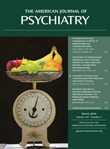Assuring That Double-Blind Is Blind
The gold standard for evidence in psychiatry, as elsewhere in medicine, is often considered to be the randomized, placebo-controlled, double-blind study. The use of blinding or masking plays a key role in these designs by addressing the problem of expectancy. First, if participants anticipate greater benefit from a particular treatment, they may be more likely to respond to it, which is considered a component of placebo response. Not surprisingly, participants have been found to report greater anticipated benefits when they were randomized to enter an active-comparator, versus a placebo-comparator, study (1). Likewise, raters may anticipate greater benefit from active drug and thus favor it in their ratings, whether consciously or unconsciously. Greater response rates in both active and placebo arms occur when a greater proportion of participants receive active treatment—that is, when patients (1) or raters (2) expect more participants to benefit.
Double-blinding, typically by providing drug and placebo in identical capsules, is intended to minimize the impact of expectancy and the related concept of credibility. The blind may be compromised in a variety of ways, however, beginning with differences in medication taste or smell. Of particular concern may be the emergence of adverse effects, particularly when those adverse effects are known to be associated with a specific medication. The requirement that informed consent forms delineate common adverse effects may increase this risk (3). Indeed, when the degree of unblinding is assessed in antidepressant trials, multiple reports suggest that it is extensive: at least three-quarters of patients are typically able to correctly guess at their treatment assignment (4, 5). Moreover, even the sudden absence of adverse effects may contribute to unblinding, as might occur when a participant stabilized on a sedating medication is abruptly switched to placebo at randomization in a relapse-prevention study.
If such unblinding occurs, does it meaningfully affect trial results? A meta-analysis of antidepressant trials using active placebos, such as those with antihistaminergic or anticholinergic effects, suggested smaller effect sizes than those observed in the presumably less blinded trials with inert placebo (6). Estimating the potential impact in published studies is difficult, but certain findings when results are stratified by potentially unblinding adverse effects raise concern. In a trial of quetiapine in bipolar depression (7), for example, when investigators examined only the groups reporting sedation, mean change in the Montgomery-Åsberg Depression Rating Scale total score at week 8 was –18.8 in the quetiapine groups (N=195) and –18.9 in the placebo group (N=24). Conversely, when the subset of participants without sedation were examined, the mean change in the Montgomery-Åsberg Depression Rating Scale total score was –19.3 and –11.7 in the quetiapine and placebo groups, respectively. While only a small subset of patients were in the placebo/sedation arm, the disparity in placebo response might suggest that clinical raters were attempting to "guess" at treatment assignment.
Unfortunately, for psychotropic drugs, CNS side effects may be inevitable. Therefore, we call for more uniform application of standards in the design, reporting, and review of clinical trials.
1. Consistent with CONSORT (8) and international guidelines (9), participants and raters should be asked to guess treatment assignment, and the degree of true and false unblinding should be reported in the primary publication of results. Statistical techniques to formally test for unblinding have been described and are readily available (10). However, while this approach may help to identify flawed trials, it does nothing to prevent them, and guesses at the end of a trial may be confounded by "true" efficacy.
2. To minimize the impact of adverse effects on efficacy ratings, one rater should evaluate symptoms but not side effects, while another rater scores side effects and not symptoms.
3. Where the risk of unblinding through adverse effects is substantial, the use of an "active" placebo should be considered, with adverse effects mimicking those of the active drug. This design is rarely used in modern psychotropic studies: A MEDLINE search for "active placebo" identified only one randomized controlled antidepressant trial since 2000 with this design. However, the ethical problem of deliberately inducing risk for adverse effects, even if they are benign or even potentially therapeutic, requires further study.
All of these recommendations are reflected in existing guidance documents for clinical trial design and analysis, and some date back more than 25 years. If readers, reviewers, and journal editors ensure that they are applied where appropriate, confidence in the gold standard for determining clinical efficacy could be enhanced.
1 : Does study design influence outcome? the effects of placebo control and treatment duration in antidepressant trials. Psychother Psychosom 2009; 78:172–181 Crossref, Medline, Google Scholar
2 : Does the probability of receiving placebo influence clinical trial outcome? a meta-regression of double-blind, randomized clinical trials in MDD. Eur Neuropsychopharmacol 2009; 19:34–40 Crossref, Medline, Google Scholar
3 : The double-blind in danger: untoward consequences of informed consent. Am J Psychiatry 1982; 139:1487–1489 Link, Google Scholar
4 : How blind is blind? assessment of patient and doctor medication guesses in a placebo-controlled trial of imipramine and phenelzine. Psychiatry Res 1986; 19:75–86 Crossref, Medline, Google Scholar
5 : Inert placebo versus active medication: patient blindability in clinical pharmacological trials. J Nerv Ment Dis 1994; 182:485–487 Crossref, Medline, Google Scholar
6 : Active placebos versus antidepressants for depression. Cochrane Database Syst Rev 2004; 1:CD003012 Medline, Google Scholar
7 : A randomized, double-blind, placebo-controlled trial of quetiapine in the treatment of bipolar I or II depression. Am J Psychiatry 2005; 162:1351–1360 Link, Google Scholar
8 : The CONSORT statement: revised recommendations for improving the quality of reports of parallel-group randomized trials. JAMA 2001; 285:1987–1991 Crossref, Medline, Google Scholar
9 International Conference of Harmonisation of Technical Requirements for Registration of Pharmaceuticals for Human Use: ICH Harmonised Tripartite Guideline: Choice of Control Group and Related Issues in Clinical Trials (E10). Jul 20, 2000. http://www.ich.org/LOB/media/MEDIA486.pdf Google Scholar
10 : Assessment of blinding in clinical trials. Control Clin Trials 2004; 25:143–156 Crossref, Medline, Google Scholar



